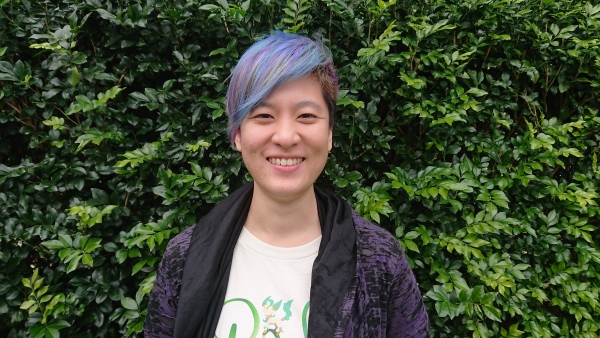Interest in linguistics led Arts & Social Sciences alumna to ‘immensely satisfying’ AI career
Emily Shen works at an international tech company where she has had the opportunity to analyse and work with more than 30 languages.
Emily Shen works at an international tech company where she has had the opportunity to analyse and work with more than 30 languages.

Emily Shen was exposed to a variety of languages as she was growing up, which sparked her interest in linguistics.
“In our household I heard Cantonese and Shanghainese; and Hakka on my mum’s side,” she says. “I also studied Japanese in high school and have been exposed to a lot of Mandarin too.”
“I was curious about the sorts of comparisons I could make between the Chinese languages, and as I picked up Japanese and dabbled in Korean, I grew more curious at how some of the words I recognised from Chinese were adapted into these unrelated languages with different sound systems.”
But she originally studied Medical Science at UNSW, before deciding it wasn’t the right field for her and signing up for Linguistics as part of a Bachelor of Arts at UNSW.
Ms Shen now works as an Associate Linguistic Project Manager at Appen, an international tech company that provides data on human behaviour in a form that computers can understand and learn from. For example, Apple’s virtual assistant Siri relies on the kind of information that Appen provides.
“It's a fascinating field that has applications in speech pathology, language education, language revival, dialect coaching and machine learning,” Ms Shen says.
Ms Shen has been at Appen for just over a year and has had the opportunity to analyse and work with more than 30 languages.
She contributes to improving and refining data that trains AI machines used in a variety of processes, such as search relevance and automatic speech recognition.
“Search relevance is the difference between typing keywords into a search engine and getting a bunch of irrelevant results, or getting the information you are actually looking for,” Ms Shen says.
“Linguistics also feeds into the technology you see on smartphones. If you think of Google Translate, Siri and auto captioning, that is the type of stuff that has linguistics theory underpinning it all.”
The UNSW alumna says studying at UNSW helped her form her own view on the world and contemporary issues we face. “Because you have to dig deep into the things you're researching for an assignment or an essay, you have to explore all the angles,” she says. “Arts really helps you refine a more nuanced take on the world. There's no simple black or white, on any issue, there's usually a massive grey area. You have to take that into consideration.”
She says she also became a better writer at UNSW. “When I started my Arts degree, I wasn't all that comfortable with essay writing. I'd come from a predominantly science background, so that was more about reports and facts and figures. I didn’t think I was very good at writing in high school and even at the start of university. But towards the end I realised I had actually gotten a lot better at writing.”
Ms Shen says she also loved the student culture at UNSW. “It was a good blend of disciplined academia and day-to-day socialising with like-minded people, some of whom no doubt will become lifelong friends.”
She credits the Arts & Social Sciences teaching staff as helping shape the person she is today. “They were really influential for me,” she says. “My supervisors were Dr Mengistu Amberber and Dr Debra Aarons – most of my linguistics courses were taught by them, and they were always enthusiastic, encouraging and at times utterly delighted by the interesting things I'd found through the course of my thesis. We still keep in contact.”
Although studying Linguistics does not have an obvious internship related experience, Ms Shen said it was through being at UNSW that her job almost quite literally landed in her lap, halfway into her Honours degree. “I kept in regular contact with my supervisors, and one of my tutors in linguistics at the time worked for Appen. There was an open channel of communication from the company to the students. So, although there's not an internship program as such for Linguistic majors, there are opportunities for professional networking. Even just keeping in regular contact with my supervisors helped a lot.”
Asked what the best thing was about studying at UNSW, Ms Shen says it was the “overall experience” that made it enjoyable for her. “The teaching staff, they were definitely the most inspirational. You could see how passionate they were about the topics they taught. They provided very interesting course material and other resources. I did Media Studies as a minor and there were some extremely thought-provoking courses, such as Social Media and its impact on the modern world. We studied the sort of language that was used on social media, and how that shaped online communities and contemporary society.”
Ms Shen’s advice to students considering doing Arts & Social Sciences at UNSW is to “please do Linguistics.” It led her to a career in machine learning and AI that she is passionate about. “I don't know if it's just me being nerdy about it; but being able to have unfamiliar languages and learn about their structures and quirks – and to do that as a day job – is immensely satisfying."
Find out more about studying the Bachelor of Arts at UNSW.